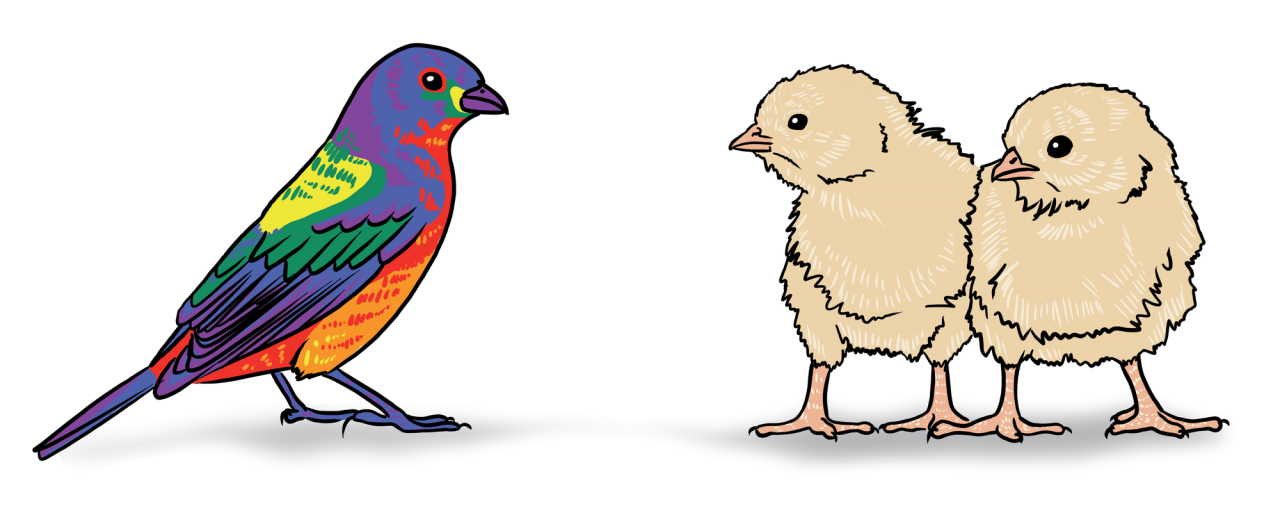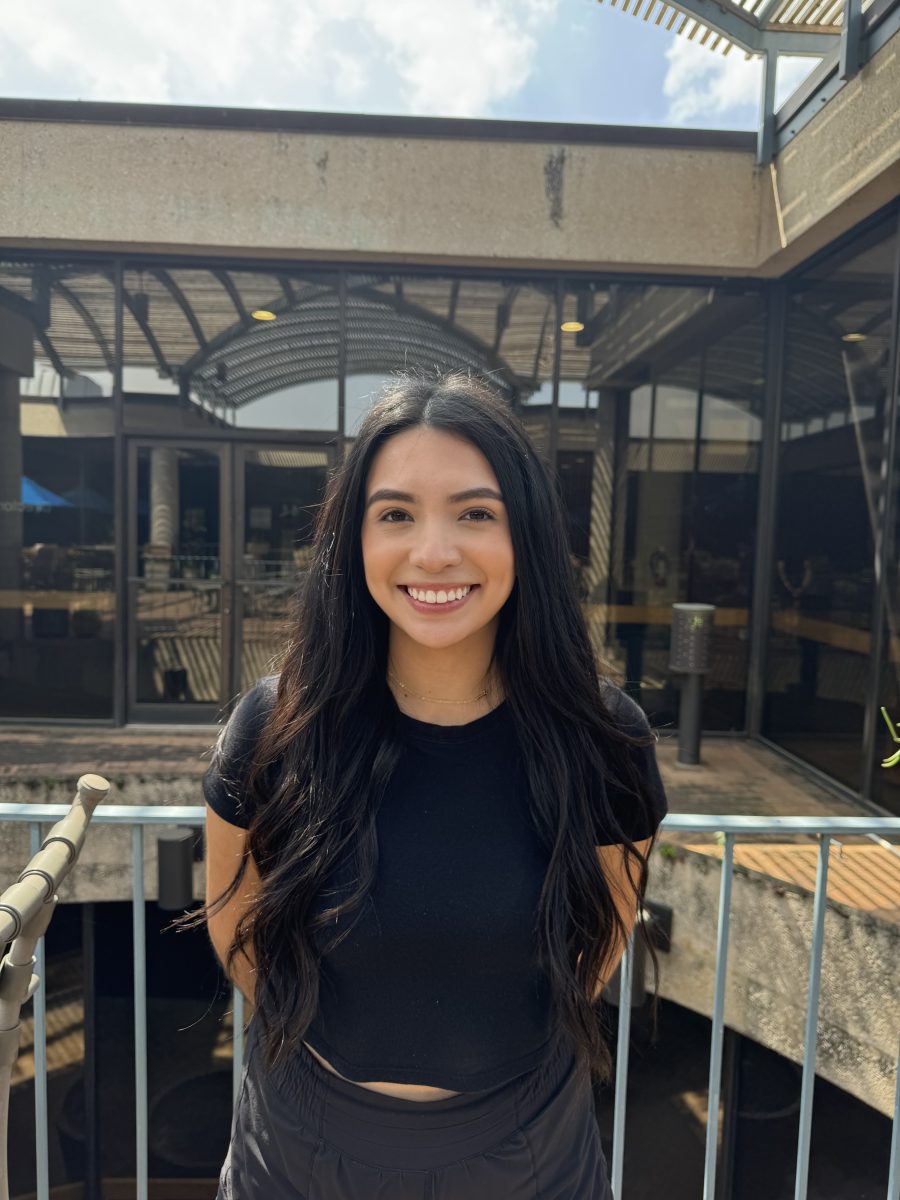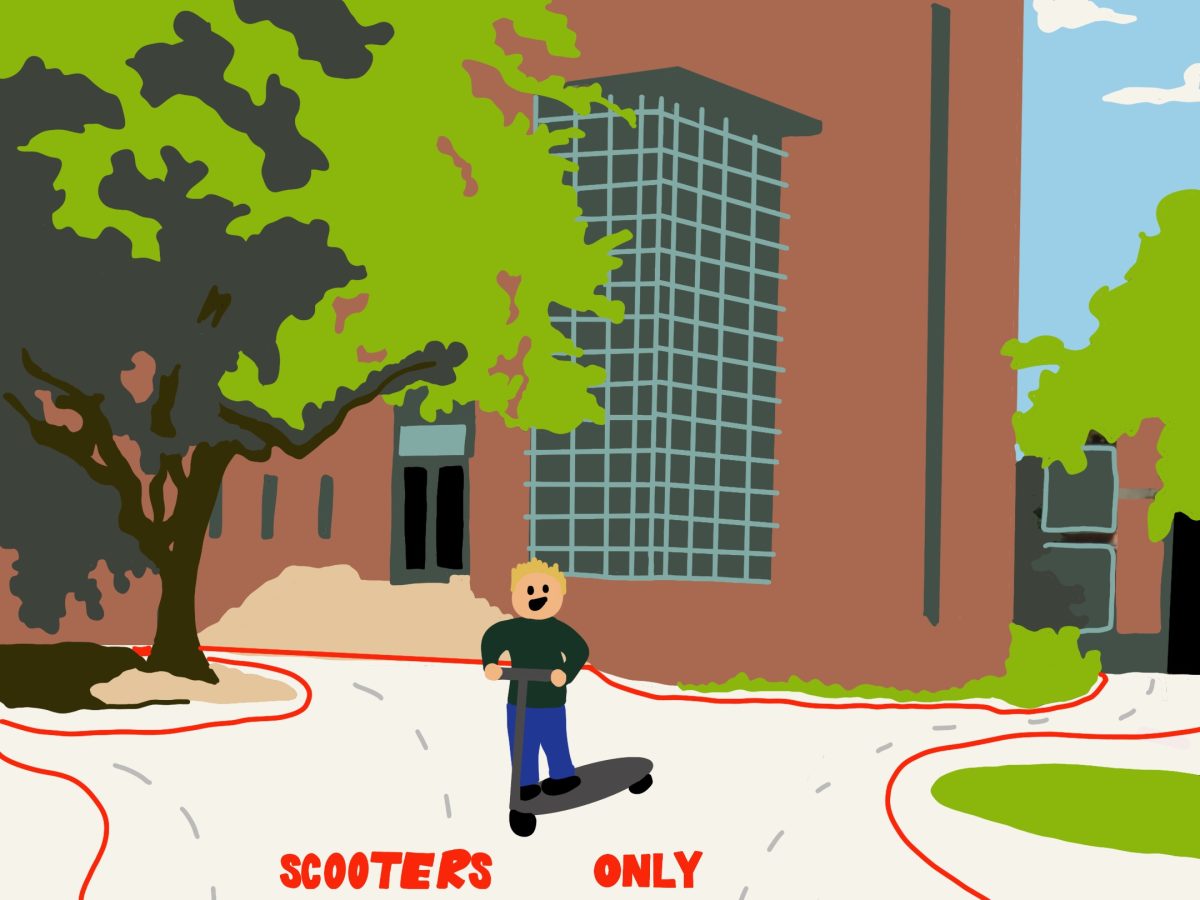Illustration by Andrea Nebhut
Chick-fil-A is the most lucrative option at Trinity’s Revolve concept in Coates Student Center. However, some students disagree with the company’s beliefs.
Chick-fil-A is vocal about its Christian affiliation and the religious values it upholds. Because of these beliefs, the company has a history of support for anti-LGBTQ+ organizations, conversion therapy and other forms of discrimination. Last year, the university decided to include Chick-fil-A in its Revolve concept, which has led students to criticize the hypocrisy of the university’s promotion of allyship and inclusivity.
“Trinity has an emphasis on diversity and inclusion, and when they continue to have Chick-fil-A at Revolve, that kind of sends the opposite message, so whether it’s Trinity continuing to have it at Revolve or us using our Tiger Bucks there, we are by fact also donating to anti-LGBTQIA organizations just as much as Chick-fil-A does,” said sophomore Claire Carlson. “I think that if Trinity wants to say that they’re a university that cares about diversity and inclusion, then they have to care about specific instances such as this, and if they don’t want to deal with things that seem too small for them to care about, then they don’t get to promote themselves as a university that focuses on those ideals.”
According to students who are upset about the inclusion of the company, the situation dismisses any progress that has been made in terms of allyship and support.
“I think that the presence of Chick-fil-A is a troubling and divisive issue for the campus,” wrote first-year Steven Drake, PRIDE community liaison, in an email interview. “Trinity and its community strive for diversity and allyship, so in contrast, the inclusion of Chick-fil-A on campus undermines our progress towards a more inclusive community and weakens the bar that students and the university have set for ourselves.”
Some students suggest the university remove Chick-fil-A from Revolve as an easy solution. According to David Tuttle, dean of students, it’s not that simple.
“At some point the question becomes, ‘How much control does the university have? How far does that go?’ I think universities have to understand — and students need to understand this, too — we need to not rob our students of the educational experiences of debating these issues and these topics,” Tuttle said. “I don’t think that a majority of students, based on sales, are against Chick-fil-A, which is why I think we would want more thoughtful student discussion about whether they want Chick-fil-A or not.”
Some students, however, feel differently. Junior Kit Alderson related it to another experience he had recently.
“I bought three boxes of Girl Scout cookies this year, and I recently learned from a friend that they may donate to some organization that I don’t really agree with, so I was like, ‘Oh well thats kind of a bummer. Oh well, I have three boxes of Girl Scout cookies,’ ” Alderson said. “I think it’s important to worry to a degree. Now that I know about it, I probably should investigate it, but I’m not gonna feel super guilty about eating these cookies that I already bought.”
The response to Chick-fil-A isn’t happening just at Trinity. Last month, San Antonio’s City Council voted against keeping Chick-fil-A in the concessions contract for the San Antonio International Airport.
Members of Trinity’s chapter of the Young Conservatives of Texas (YCT) protested this decision with a social event held at a local Chick-fil-A franchise. In an email to their members, YCT wrote that they would eat at the restaurant “to show [their] support for a business’s right to donate to whichever organizations it wants to.”
These organizations include the Fellowship of Christian Athletes, the Salvation Army and the Paul Anderson Youth Home, all of which support anti-LBGTQ+ discrimination and conversion therapy.
Junior Isaiah Mitchell, president of YCT, explained why the campus organization decided to arrange this social.
“We’re not a religious group, but obviously, we stand for religious freedom. We support the right of businesses to donate to whichever businesses they want to, and furthermore, we do have a large Christian population in the club, as a lot of people would expect,” Mitchell said. “It becomes really easy at this point to misconstrue historically, soundly Christian belief on sexuality as something offensive or oppressive because the goal posts have kind of moved on what is accepted sexually and what isn’t and what’s acceptable to talk about on that topic.”
Mitchell explained that the role of the social was to be supportive of the constitutional right to freedom of religion. He emphasized that the social was not intended to be an act against the LGBTQ+ population at Trinity or elsewhere.
“At this point, any objection to homosexuality or preference of heterosexuality over homosexuality can, on a campus like this, become something much more radical than its really intended to be,” Mitchell said. “I think it’s something that people overreact to something that’s very orthodox Christian teaching, and on top of that, people misconstrue that teaching on that topic with the hatred of the people involved. In Christianity there’s an important distinction between sin and people. You’re supposed to love the sinner and hate the sin.”
Carlson disagrees.
“I think that when your religion’s views kind of go against someone’s identity, there’s an issue there,” Carlson said. “I think you need to reevaluate your religion and how you view people if you’re not viewing them as people anymore. In that sense, I do agree that religious freedom is important, but its important to a certain extent, and you don’t get to value your personal beliefs over someone else’s existence.”
Mitchell emphasized that YCT is not a hate group or an anti-LGBTQ+ organization; rather, the members intend to uphold constitutional values.
“We’re a really big umbrella, especially at Trinity, which is so small. We have gay members. We can’t be an anti-gay group, and we’re not. Our values are pretty broad, just surrounding freedom and the preservation of the values of the Declaration of Independence and the Constitution, and beyond that, there’s not much that’s too specific,” Mitchell said. “Naturally, we have a lot of people who are traditionalists when it comes to sexuality but we also have homosexual members who are also traditionalist, but they separate that from their personality, and we have people who are very libertarian about it, and they’re cool with gay marriage.”
According to Mitchell, criticizing Chick-fil-A for its donations is a stretch.
“Our support for Chick-fil-A was not necessarily a support for the groups that they donate to. That’s going a little far down the chain,” Mitchell said. “We really were just standing up in support of religious freedom and not getting too specific into the history of Chick-fil-A’s donations. That’s a little bit too specific for what we were trying to do.”
According to sophomore Lisa Vetyuhova, this approach is lazy.
“We’re constantly bombarded with information. Blatant information, social media and otherwise. We have open access to information. You can keep up with literally everything,” Vetyuhova said. “It’s a matter of where your morals lie, where your heart belongs and what you’re willing to fight for.”
As for the university’s decision to have Chick-fil-A in Coates, Vetyuhova has the same response.
“It’s clear that they choose this passive stance on LGBT rights because it’s just not convenient for them to fight for it,” Vetyuhova said. “They don’t want to expend the energy. It’s easy when you’re not impacted by that issue, and the issue of being an ally is constant. You can’t pick and choose what you fight for.”
Want to be part of the dialogue? Email us at [email protected].














Angelique Lopez • Apr 10, 2019 at 2:13 pm
“I think you need to reevaluate your religion and how you view people if you’re not viewing them as people anymore… You don’t get to value your personal beliefs over someone else’s existence.”
I don’t think it’s fair to immediately conclude that Isaiah’s and others students’ religion and views do not see the LGTBQ+ community as people, or that they are opposed to the LGTBQ+ community’s existence. It’s also not fair to immediately conclude that YCT is choosing a “passive stance on LGBT rights because it’s not convenient for them to fight for it” and because YCT doesn’t “want to expend the energy.”
The main reason people protest the vote against Chick-fil-A, as Isaiah said, is religious freedom. Some students’ religions believe in the traditional definition of marriage, but that doesn’t mean they’re necessarily against gay people. If the presence of Chick-fil-A on campus is such an offense that Trinity needs to remove its presence on campus, what does that mean for religious groups at Trinity? For example, Catholicism also believes in the traditional definition of marriage between a man and woman, and that homosexual acts are sins. Does that mean the presence of CSG, or other Christians that believe in the traditional definition of marriage, on campus is controversial too? that we need we must consider not having them on our campus either?
How about this: Why don’t those who don’t want to support Chick-fil-A simply not buy from Chick-fil-A?
Emily • Apr 8, 2019 at 8:11 pm
I think that part of the problem here is a fundamental misunderstanding of what it means to be a member of a marginalized community. Of course a “majority” of students would be on-board with Chick-Fil-A being in revolve because a majority of the students at this university are not directly affected by Chick-Fil-A’s donations. Framing the conversation around sales as opposed to the comfort and safety of marginalized students reinforces the idea that we are addendums to Trinity’s community as opposed to being valued members.
Rob Cramer • Apr 6, 2019 at 6:34 pm
This guy Isaiah Mitchell sounds like an absolute bigot in these quotes. Oyyy Trinity.
Stacy Davidson • Apr 5, 2019 at 8:10 pm
When the Dean of Students responds to student concerns about a social justice issue using the words “control” by the “University” and “sales”, I think we can agree that the administration continues to be tone deaf to how their decisions impact the student experience and their personhood on that campus. Where was the “thoughtful student discussion” before this decision was made? Did the Dean not know about Chic-Fil-A’s history? He claims to be such an ally of diversity. He created a Facebook page for diversity discussions. I guess he didn’t get the memo on this one even though this has been common knowledge for quite some time. And now he wants to post articles to read? Ha, nice try. I applaud students who continue to challenge the administration on their lack of awareness of what are some very basic social justice issues for students on campus. It was exhausting for me when I tried to have these types of discussions with my colleagues and was told by the VP of Student Affairs to stop making them feel like Trinity is “broken.” #whitefragility
David Tuttle • Apr 4, 2019 at 6:40 pm
I want to add that I also mentioned we could discontinue using Chik-fil-A quite simply and quickly. The Dean of Students Office and Trinitonian are planning a program to discuss this topic, tentatively on April 17 at 8 pm. My thoughts are that if the students collectively want this discontinued, we would take the advice of SGA as the student representative organization in the form of a resolution.
Some interesting pieces to inform discussion:
https://www.queerty.com/lesbian-vlogger-burns-chick-fil-a-with-anti-gay-anti-me-speech-20120801
https://www.vogue.com/article/ethical-consumer-rentrayage-batsheva-lidia-may
https://www.eater.com/2019/4/4/18295231/chick-fil-a-anti-lgbtq-donations-dan-cathy-gay-marriage
https://www.usatoday.com/story/money/2019/03/22/chick-fil-ban-texas-council-bars-chain-airport-lgbtq-past/3247437002/